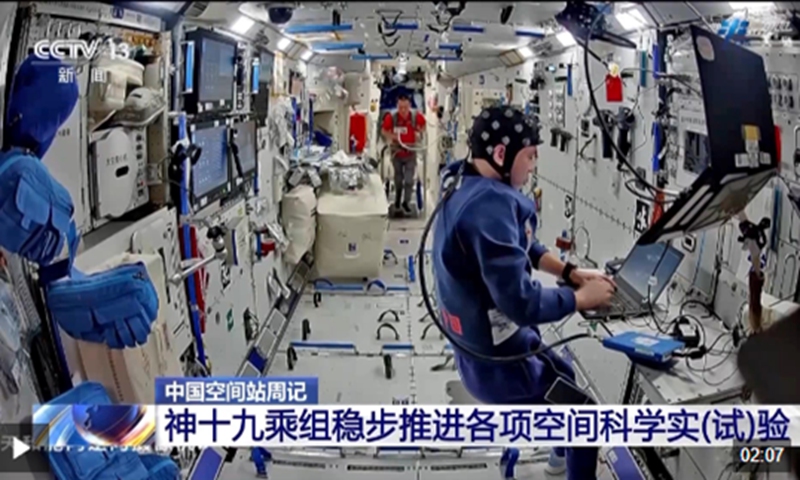
Photo: Screenshot from CCTV News
The China Manned Space Agency (CMSA) said that the Shenzhou-19 crew is scheduled to return to Earth around May 1, and the mission crew have been steadily advancing space scientific experiments and technical tests during their final days aboard the China Space Station, the CCTV News reported on Sunday.
The crew - Cai Xuzhe, Song Lingdong and Wang Haoze - conducted multiple experimental tests using brainwave monitoring equipment this past week, CCTV reported.
Ground-based researchers will utilize the collected data to investigate gravitational effects on visual-motor information processing, reveal cognitive patterns and neural mechanisms of spatial relationships in microgravity environments, and explore the regulatory effects of brainwave music intervention on executive control functions during prolonged spaceflight, said the report.
During the past half year, the crew gathered data on the space station's overall habitability assessment, real-time human-machine interface feedback and equipment layouts in designated areas through questionnaires and video recordings.
By doing so, ground researchers are expected to analyze transmitted data to identify issues, summarize design experiences and propose targeted, systematic recommendations for improving spacecraft ergonomic design and habitability standards, CCTV said.
The three taikonauts aboard completed in-orbit pharmacokinetic research, accumulating data to inform future space medication protocols, according to the report.
In the field of aerospace technology tests, tasks such as the assembly and testing inside the payload cabin of the space reverse Brayton high-capacity refrigeration technology experimental project are being carried out as planned.
Targeting future deep-space exploration requirements, this project verifies ultra-high-speed dynamic pressure gas-lubricated bearing technology for large-scale refrigeration applications, to advance China's thermal control capabilities and provide technical support for future space missions, said the report.
Multiple microgravity physical science experiments progressed as scheduled, with crew members completing sample replacements in the fluid physics rack and high-temperature materials rack, along with vacuum pumping and exhaust procedures.
Additionally, the crew performed various environmental monitoring tasks including air velocity measurements, temperature assessments and air purity tests, while conducting routine equipment maintenance checks this past week.
Thy also underwent comprehensive medical evaluations including electrocardiograms, exercise pulmonary function tests, and dynamic cardiovascular monitoring, while implementing weightlessness countermeasures.
This year, China's Tiangong space station is expected to welcome two more crews of Shenzhou-20 and Shenzhou-21, along with the Tianzhou-9 cargo spacecraft. The selected taikonauts are currently undergoing relevant training, according to the Xinhua News Agency.
Global Times




